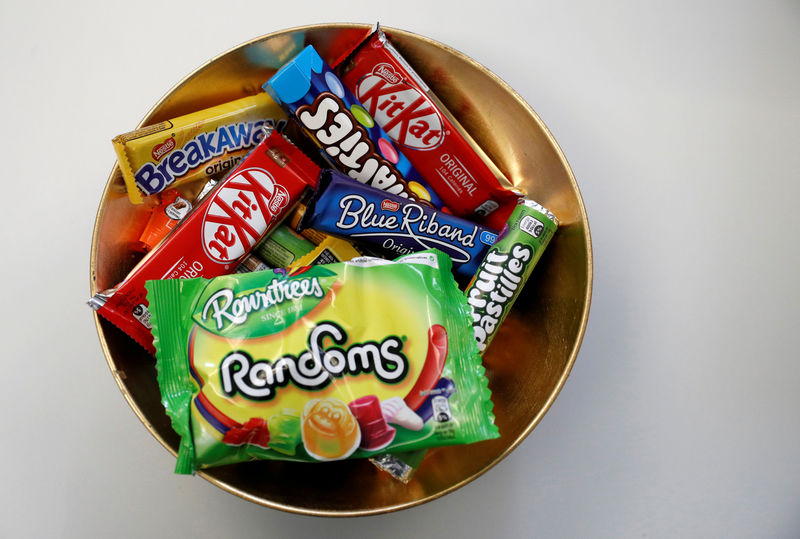By Silke Koltrowitz and Martinne Geller
ZURICH/LONDON (Reuters) - First-quarter sales growth at Nestle (S:NESN) and Unilever (L:ULVR) was driven almost entirely by shifting more goods, in a stark illustration of how hard it is for consumer products makers to raise prices in a competitive retail environment.
Multinational makers of everything from soup to soap are under pressure to boost revenues as consumers flock to fresher products and newer brands. The large retailers they sell through face their own pressure to keep prices down, as they battle new competition from drug stores and Amazon.com (O:AMZN).
The result has been mounting tension, which recently erupted in a clash between Nestle and European retailers that saw some of the Swiss company's goods briefly taken off store shelves. That row was itself an echo of a 2016 standoff between Unilever and British supermarket giant Tesco (L:TSCO).
On Thursday, results from both manufacturers suggested those tensions remain high. Nestle's 2.8 percent underlying sales growth only got a 0.2 percent boost from higher prices, and Unilever's 3.4 percent growth just a 0.1 percent lift.
"We expect chronically weak pricing from both Unilever and Nestle to play to the market's fears of weak pricing power, fuelled by channel shift, in the face of rising commodities (prices)," Jefferies analyst Martin Deboo said.
The pricing pressure was even tougher for U.S. giant Procter & Gamble (N:PG), which on Thursday reported just a 1 percent rise in underlying quarterly sales growth.
That included a 2 percent hit from lower prices, offset by higher volumes and other factors. The maker of Gillette razors cut some prices last year amid competition from subscription-based rivals such as Dollar Shave Club, owned by Unilever, and Harry's.
Unilever shares were down 2 percent, while Nestle's were up 0.3 percent, as investors looked past the pricing issue at the Swiss food giant to the fact its overall sales exceeded expectations after several disappointing quarters.
That beat, and a pick-up in volume, is welcome news for Nestle's new CEO Mark Schneider, who took the top job at the maker of KitKat chocolate bars and Maggi soups in 2017 with the mission to return it to solid growth after six years of decline.
Schneider said underlying growth would improve during 2018.
Consumer sentiment in Europe, as measured by researchers GfK, declined in March to a reading of 20.6 points from 21.1 points in December.
"The mood of European consumers is proving to be rather less optimistic in the first quarter of 2018 than at the end of last year," the group said on Thursday. "In France and Austria, in particular, the euphoria appears to have diminished temporarily in the wake of the elections."
WANING PRICING POWER?
Consumer goods makers and retailers are always in complex negotiations around pricing and promotions to suit their ambitions. If a manufacturer wants to take market share, it might discount, or seek price increases to boost margins.
Russ Mould, investment director at AJ Bell, said trends suggested Unilever and some of its peers had "blinked a little" on pricing due to growing competition, even though they represent powerful, established brands.
"Brands are still a vital part of any company's pricing power armoury but ... some companies are stronger in the food chain than others, depending on size, route to market and the availability of alternatives," Mould said.
Nestle and Unilever are two of the world's biggest packaged goods companies, with the Swiss giant home to Gerber baby food and Perrier water, and its Anglo-Dutch rival the company behind Dove soap and Ben & Jerry's ice cream.
This is Unilever's second quarter of volume-led sales growth, after several quarters fuelled by pricing. Finance chief Graeme Pitkethly said the earlier price rises, and corresponding weak volume, were partly due to currency-related inflationary pressures in certain markets that have since abated, giving consumers more confidence to spend on everyday items.
As a result, sales volume in emerging markets, where Unilever does the majority of its sales, was ahead of expectations, according to Barclays (LON:BARC) analysts.
"The good news is when you have more muted pricing, more consumers buy more of your brands," Pitkethly said, adding that minimal commodity price inflation had also inhibited the ability to raise prices.
He said the main pricing trouble spots were Brazil and Indonesia, which both saw prices fall due to weak consumer sentiment; India, due to a tax change put through last year; and Britain, where retail competition is fierce.
These four countries make up 25 percent of Unilever's sales, Pitkethly said. Other countries, such as Turkey and Mexico, saw a good balance, he said.
The overall balance of price and volume would improve in the second half of the year, Pitkethly said.
Both companies confirmed their sales guidance for the year, with Nestle aiming for 2-4 percent underlying sales growth and Unilever looking for 3-5 percent growth. Unilever said growth in the second quarter would be near the lower end of the range.
Nestle also said it was on track to return to mid-single-digit underlying sales growth by 2020.
Nestle highlighted a return to volume growth in the Americas, helped by strong petcare and coffee creamers sales, while growth in Asia benefited from the timing of the Chinese New Year.
Unilever also called out a strong start in North America, helped by innovations such as the new brand Love Beauty and Planet and acquisitions such as Dollar Shave Club.
(This version of the story fixes typo in headline.)
